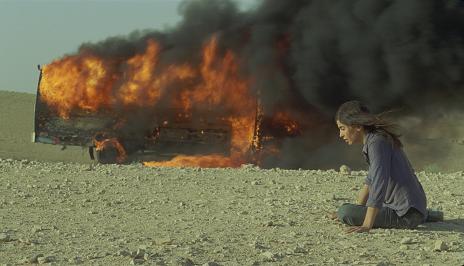With “Polytechnique”, Denis Villeneuve finally shook off all his film school tics and misguided attempts at profundity, instead making a brilliantly crafted picture that took a dark page from History and made it feel immediate and personal. It wasn’t a flawless film, but it stuck with you. “Incendies” goes even further, both in its filmmaking mastery and thematic depth. It’s still not a perfect film, but it’s damn close to being a great one nonetheless.
Of course, you have to give some of the credit to Wajdi Mouawad, who wrote and directed the original play this is based on. Then again, from what I understand, Villeneuve did a real adaptation job on it, stripping it of all its theatricality and making it truly cinematic.
Right from the opening, a chilling dialogue-free sequence set to Radiohead‘s You and Whose Army that shows Middle Eastern boy soldiers being groomed for combat, “Incendies” is a visually striking experience. Villeneuve and his faithful cinematographer André Turpin have always been known for their ability to create beautiful images, but never have they been so evocative and lyrical, in part thanks to the starkness of the Jordan locations where the film was shot.
One of the film’s weaknesses is the casting of the actors playing those who initially seem to be the protagonists, non-identical twins Jeanne et Simon. Now, the fact that Mélissa Désormeaux-Poulin and Maxim Gaudette aren’t Middle Eastern may seem bothersome at first, but I went along with it. Hey, if All-American Charlton Heston can play a Mexican in “Touch of Evil”, I don’t see why Québécois can’t be convincing as Arabs. No, what did bother me a bit is that I just don’t think they’re all that great here. They’re good enough, I guess, but some line deliveries and reaction shots of theirs made me cringe, and if the film managed to move me, it’s generally in spite of them…

…and because, thankfully, it turns out that they’re not actually the protagonists of “Incendies” – not the only ones, anyway. Most of the film belongs to the amazing Lubna Abazal, who plays the twins’ mother, Nawal. Even though she dies early on, leaving a will that sets off Simon and Jeanne’s search for the father they thought was dead and for a brother they didn’t even know existed, the numerous flashbacks that make up the bulk of the story allow us to see her harrowing journey through life, which is full of disturbing experiences I wouldn’t dare spoil here.
There’s a Tarantinoesque quality to the non-chronological structure of the screenplay, not to mention its use of chapter titles, but of course, the tone and the actual content of the story are very different. “Incendies” could be described as a Greek tragedy set against the backdrop of a war movie. It’s ostensibly about the Lebanese Civil War, but unless you’re already well versed in the complex series of conflicts between Muslims and Christians that went on from the 1970s to 1990, don’t expect to fully understand the details of the historical context. The film is intentionally vague about the specifics (Lebanon is never even named, and the city names used are made up), and in any case, the reason why various horrors are committed ultimately doesn’t matter. There are no good guys or bad guys here, just people stuck in a vicious circle of violence. When people start killing each other, everyone loses in the end…
As mentioned, the parts involving the twins aren’t as compelling, but everything that has to do with their mother is riveting. So much so that by the end of “Incendies”, Nawal, as heartbreakingly portrayed by Lubna Abazal, casts a shadow over the whole film, even when she isn’t on screen. Villeneuve has done his best work yet here, but I’m sure he himself would admit that that he couldn’t have done it without this incredible actress.
Posted on September 14, 2010January 3, 2014Author KevinCategories Movie Reviews
